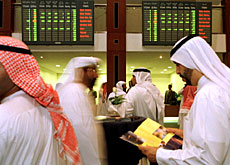Swiss banks set sights on Muslim customers

Western banks are showing increasing interest in Islamic banking and Swiss banks are proving no exception to the trend.
UBS, Switzerland’s biggest bank, recently became the first Western bank to open a branch operating under Sharia law in an Islamic country.
“By setting up Noriba bank in Bahrain, UBS has opened up Swiss banking to Muslims who want to use Sharia banking practices,” financial expert Gian Trepp told swissinfo.
Switzerland already houses a number of financial institutions which operate according to banking principles set out under Sharia law, such as the Kanz bank in Geneva, which was founded in 1998.
Sharia law covers all areas of Muslim life, ranging from banking to the family, and is based on religious beliefs set out in the Koran, the Islamic holy book.
Sharia banking differs from standard banking in two main ways. First of all banks and customers are not allowed to profit from interest payments – termed “usury” in the Koran.
“We have to find different forms of investment opportunities, as you can’t have a savings account [which increases through interest payments],” explains Christoph Meier from UBS.
“You have to invest in equities or certain forms of leasing so you can profit from [investment appreciation].”
Capital gains
The capital gains made on investments are then shared between the bank and the client, enabling both parties to make money.
The proscription of “usury” is not, however, unique to the Muslim faith. In the past, other religions also outlawed interest payments, deeming them a reward for idleness.
The second difference is that banks and their clients are not allowed to invest in companies which contravene Islamic law.
“Islamic law bans any investments in companies which deal with business that the faith does not accept, such as alcohol, tobacco and pornography,” says Meier.
Sharia banking has grown almost exponentially since the early 1970s, when many Muslims looked for ways to invest the money they made from selling oil.
This led to the opening of the Institute of Islamic Banking and Insurance, which now has offices in 75 countries worldwide, including the Dar Al-Maal Al-Islami (DMI) Trust in Geneva.
Year-on-year growth
Sharia banking is now big business. Estimates suggest that Islamic bank investments total $230 billion dollars. Over the next five years this is expected to increase by 15 per cent year on year.
More and more financial institutions offering Sharia banking are opening. To date Pakistan, Iran and Sudan have transformed all their financial institutions to comply with Sharia law
Malaysia is also setting up an Islamic banking system to complement its mainstream financial services.
Its popularity also looks set to increase if military action is taken against Iraq. Some Gulf state citizens, with bank accounts in the United States, fear that their assets may be frozen if Baghdad fails to comply with weapons inspectors.
Indeed, following accusations from the US that some Saudi money could be funding terrorist activity in the wake of the September 11 attacks, some Saudis chose to take their money out of the US and put it in Euro zone and Swiss accounts. Islamic banks also profited from this capital flight.
Unknown quantity
Although there are Islamic banks in Switzerland, Gian Trepp says the precise number is not known. Neither the Swiss National Bank nor the Swiss Federal Banking Commission (SFBC) has specific details.
Trepp fears the banking watchdog is dragging its heels when it comes to Sharia banking.
“The SFBC is not interested in Islamic banking, even though Sharia banking carries certain risks, which a banking watchdog should monitor,” he says.
However, SFBC spokeswoman Tanja Kocher rejects the charge, insisting that Switzerland’s existing banking regulations are sufficient to control and monitor Sharia banking.
Tougher regulations
However Kocher says that the SFBC could strengthen its existing regulations to take account of Islamic banking, if Sharia banking continues to expand in Switzerland.
But Trepp insists this is not enough. “Now is the time to act,” he says, adding that regulations should develop in tandem with the growing sector.
“By doing nothing, the SFBC will harm this specialised sector as there are no defined foundations on which to grow.”
Trepp points to the examples of Britain and France, where action has already been taken to monitor Sharia banking.
He says that Britain’s banking watchdog, the Financial Services Authority, has already scrutinised the Islamic banking sector.
swissinfo, Hansjörg Bolliger and Sally Mules
Sharia banking is based on principles set out in Islamic law based on the Koran.
Because the Koran forbids the taking of interest payments, Sharia banks’ clients tend to invest in financial products that produce a capital gain, such as equities and bonds.
Investments are restricted to companies which comply with Sharia principles: no investments can be made in firms that produce alcohol, tobacco and pornography.

In compliance with the JTI standards
More: SWI swissinfo.ch certified by the Journalism Trust Initiative









You can find an overview of ongoing debates with our journalists here . Please join us!
If you want to start a conversation about a topic raised in this article or want to report factual errors, email us at english@swissinfo.ch.